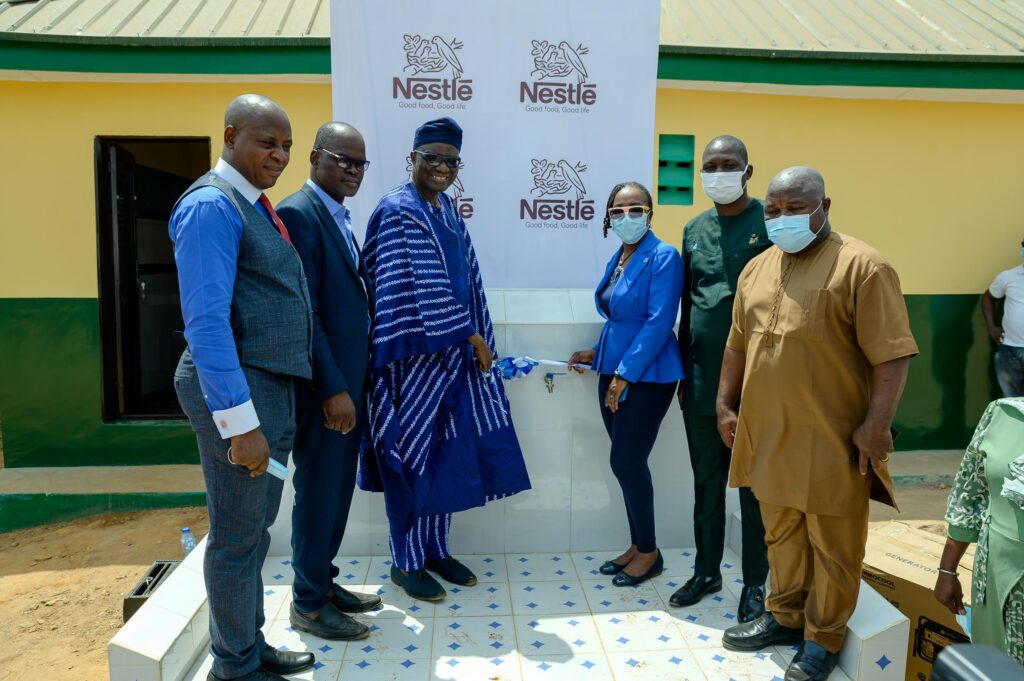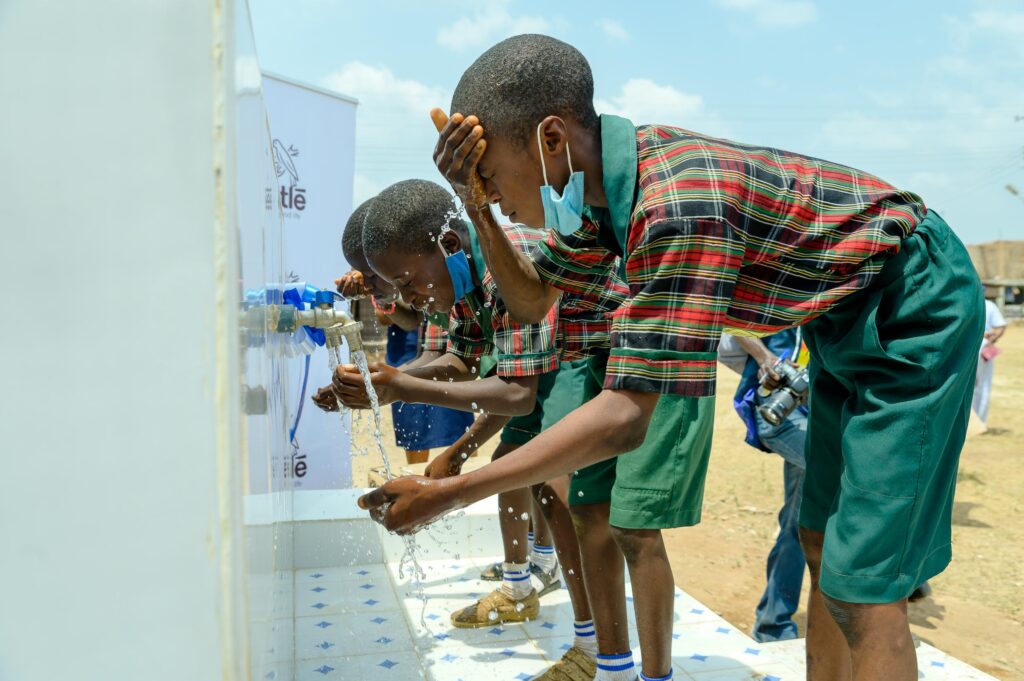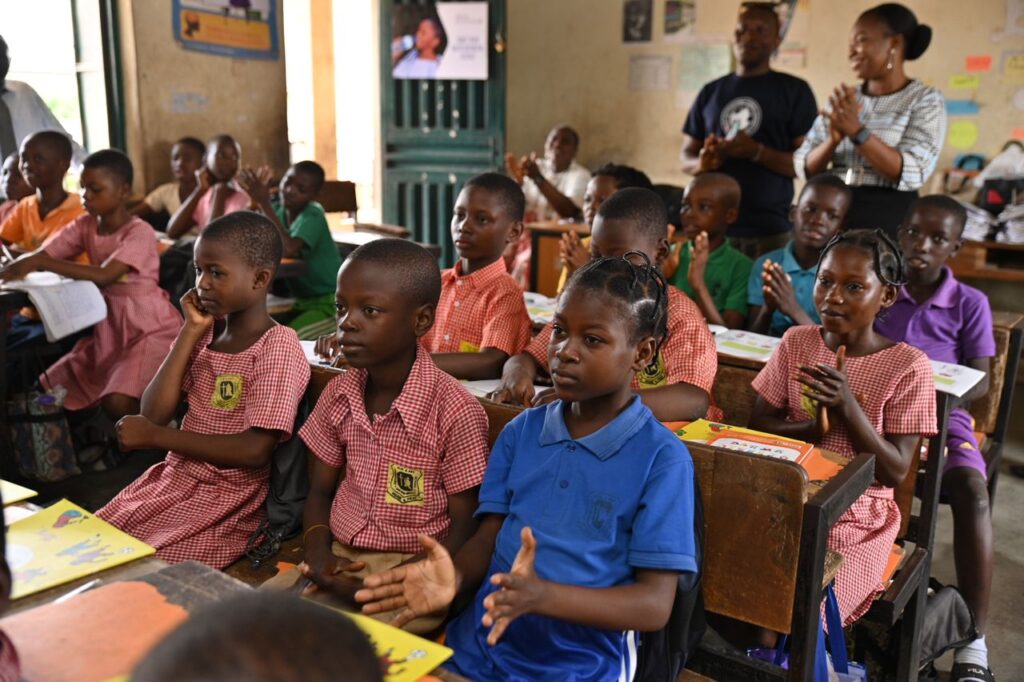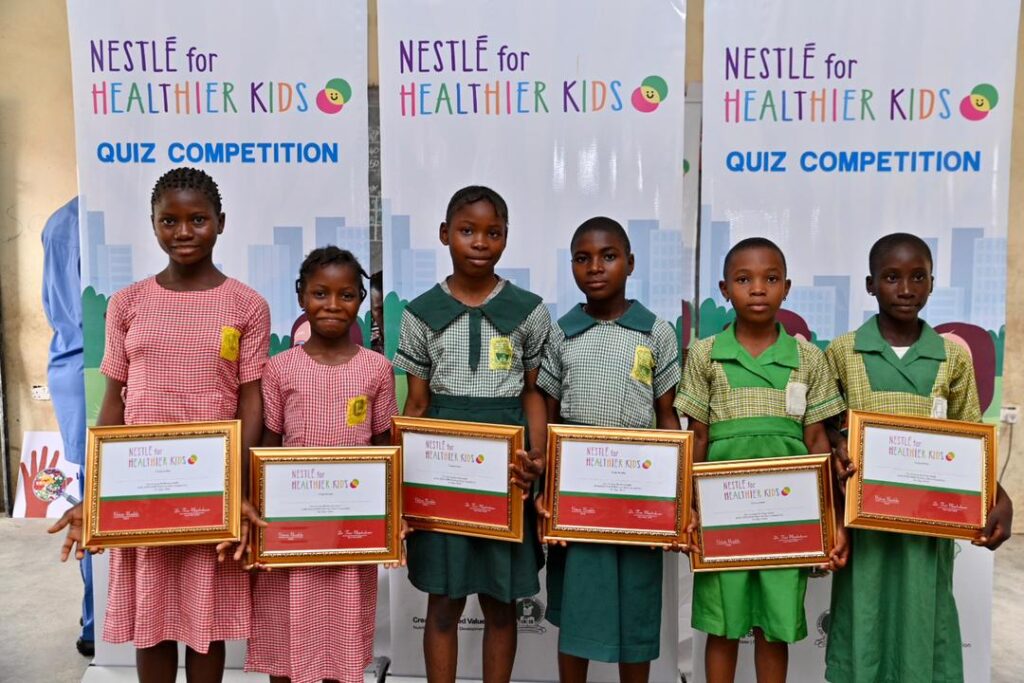
By Vivian Ihechu, News Agency of Nigeria (NAN)
Nigeria, a vast country with many states and ethnicities still has majority of its communities yearning for development.
Inadequate infrastructure, especially in the education and health sectors, as well as lack of Water, Sanitation and Hygiene (WASH) facilities among others challenges, limit communities from advancing optimally.
Community development aims to build stronger and more resilient local communities through collective actions and generating solutions to common problems.
It seeks to empower individuals and groups of people with the skills they need to create change within their communities. Development improves the lives of citizens and creates communities that are economically and socially stable, with impressive outcomes.
Governments are not able to create these opportunities alone; therefore, communities, individuals and organisations are expected to contribute their quotas to the development of communities.
A company, while building its business, for instance, is expected to support empowerment of communities and vulnerable groups around it by developing, implementing and monitoring micro-social infrastructure projects.
It is expected that the company should create avenues to strengthen skills and capacities of local government authorities and sectoral public agencies to support communities and build partnerships. Nestlé Nigeria Plc., a food and beverage company, has made remarkable efforts in this regard.
Through its Creative Shared Value concept, Nestlé Nigeria impacts its host communities through empowerment and institution of projects that are mutually beneficial.
Creating shared value is the practice of creating economic value in a way that also builds value for society by addressing its needs and challenges. Nestlé has contributed significantly in the areas of education and WASH.

On education, the parent company through its flagship initiative, Nestlé For Healthier Kids (N4HK), aims to help 50 million children globally lead healthier lives by 2030.
In Nigeria, N4HK incorporates a school-based nutrition education programme, which helps children to imbibe healthy habits, including good nutrition, active lifestyles through adequate physical activities, good hygiene practices and hydration.
Nestlé Nigeria is helping no fewer than 1,000 children, beneficiaries of Nestlé for Healthier Kids (N4HK) programme in six primary schools in Ogun and the Federal Capital Territory (FCT), to imbibe a sustainability mindset at an early age.
This is in collaboration with the International Climate Change Development Initiative (ICCDI).
Nestle and ICCDI train primary five learners on a more sustainable approach to managing and recycling waste in a bid to enable them to become better stewards of the planet.
This is one of the initiatives to support the company’s ambition of ensuring that none of its packaging, including plastics, ends up in landfills as litter, or in waterways, rivers or oceans.
The Corporate Communications and Public Affairs Manager of Nestlé Nigeria Plc., Victoria Uwadoka says: “Nestlé Nigeria is committed to driving more sustainability awareness to help protect the planet for future generations as embedded within our purpose at Nestlé.
“As multiple researches have proven, habits imbibed early in life are more likely to remain with us into the future.
“Therefore, training children on the importance of protecting our environment is a strong contribution toward ensuring more responsible management of post-consumption waste as they grow, taking us closer to achieving a waste-free future.”

Elaborating on the objectives of the training, Mr Olumide Idowu, Founder of the ICCDI says: “The sustainability training is designed to equip the children with the requisite knowledge and support, enabling them take responsibility in school and at home.
“Everyone, including children, needs to be involved in this huge task of protecting the environment.”
At the kick-off of one of the trainings at Methodist Primary School 2, Ago-Oko, Abeokuta, Ogun, the Chairman of Ogun State Universal Basic Education Board, Dr Femi Majordomos, was represented by the Board Secretary, Mr Olalekan Kuye.
He commends Nestlé Nigeria for the initiative aimed at enhancing sustainable environment-friendly practices within public primary schools in the state.
He believes that training on waste management and recycling will contribute positively to a safe and hygienic environment.
Also, the Special Adviser to Ogun State Governor on Primary and Secondary Education, Mrs Ronke Soyombo, who was at the event, lauds Nestlé’s consistent contributions and investments in education in the state.
She lists expected outcomes of the training to include positive behavioural change that will enhance environmental sustainability.
She notes that the training was an opportunity for learners to be upskilled on conversion of waste to useful items.
In 2021, no fewer than 150 children in two primary schools in Ogun benefitted from the Sustainability Training.
In 2022, the programme scaled up to six N4HK beneficiary schools, four in Ogun and two in the FCT.
The schools include – Methodist Primary School 2, Ago-Oko, Abeokuta; Oke Ona United Primary School, Abeokuta; NUD Primary School, Owode; and All Saints Primary School, Owode.
The schools in the FCT are UBE Primary School, Kuje, and Science Primary School, Kuje.
The Nestlé Community Scholarship Scheme is another platform the company uses to impact its hosts communities in the area of education.
It is a scheme positioned to enable deserving students of its host communities to attain educational and personal aspirations through financial sponsorship.

Leaners of All Saints Primary School Owode in Ogun State, using the newly commissioned facility.
It aims to contribute toward creating a future for the youth by preparing them to participate in the industry.
Its focus on science and technology is deliberate to build much-needed local capacity.
Several factors including inadequate infrastructure and lack of opportunities, accessibility and affordability, are major issues limiting access to quality education in Sub Saharan Africa.
The scheme, which was launched in 2020 for host communities of the company’s factories located at Sagamu Interchange, Ogun; Abaji, FCT; and Agbara (host community of its third factory in Agbara, Ogun, has no fewer than 109 students currently benefitting.
It is in two categories – senior secondary and tertiary.
Grant funds cover tuition, accommodation, uniform, books and other expenses for the duration of beneficiaries’ education in the respective categories.
This programme is aligned to Sustainable Development Goal (SDGs) 4 – ensuring inclusive and equitable quality education and promoting lifelong learning opportunities for all by 2030.
Education is key to prosperity as it opens a world of opportunities.
The Commissioner for Education, Science and Technology in Ogun, Prof. Abayomi Arigbabu, was represented by the Zonal Education Officer, Ado-Odo Ota, Mr Olugbenga Kikisuhu, at one of the events.
“One of the most important scholarship benefits to our society is that it gives us engineers, doctors, academics, lawyers and scientists from backgrounds that ordinarily could not have met up with the financial burdens of education,’’ he remarks.
On his part, the Alagbara of Agbara Kingdom, Oba Lukman Jayeola Agunbiade, Olute III, says: “This scholarship scheme is a laudable initiative by Nestlé Nigeria Plc.
“ I am delighted to be part of this event promoting the education and empowerment of youths in Agbara.
“The company has positively impacted the community over the years, and we have enjoyed a good relationship.”

(L to R) Mr. Oluwatosin Sofoluwe, Deputy Zonal Education Officer for Obafemi Owode, representing the Ogun State Honorable Commissioner for Education, Science and Technology, Prof. Abayomi Arigbabu.
Mr. Sola Ogunbo, Program Manager, Ogun State Rural Water Supply and Sanitation Agency
Dr Femi Majekodunmi, Executive Chairman, Ogun State Universal Basic Education Board (SUBEB)
Victoria Uwadoka, Corporate Communications and Public Affairs Manager, Nestlé Nigeria PLC
Shakiru Lawal, Country HR Manager, Nestlé Nigeria PLC
Gbenga Oladunjoye, Factory Manager, Nestlé Flowergate Factory
One of the beneficiaries of the scholarship in the tertiary category, Miss Rereloluwa Obafemi-Moses, a medical student of the University of Lagos, expresses delight at being selected as a beneficiary of the scheme.
She says the award means a lot to her and will further spur her commitment to academics.
Nestlé Nigeria continues to make a meaningful difference in her host communities by creating initiatives to help youths to unlock their potential.
Through the scholarship scheme, Nestlé continues to help to build the next generation of science and technology professionals as it creates shared value to help to build communities.
Another way Nestlé promotes education is by organising Nestlé Nutrition Quiz Competition for children in Ogun and the FCT. The competition, which aims to test the children’s knowledge and practice of healthy nutrition, is designed to enhance recall and retention of in-class lessons.
It is also part of the company’s flagship initiative, Nestlé for Healthier Kids (N4HK).
Re-launched in Nigeria in 2018, Nestlé for Healthier Kids is supported by the Ogun State Universal Basic Education Board, FCT Universal Basic Education Board, Nutrition Society of Nigeria, Federal Ministry of Education and Federal Ministry of Health.
Twenty schools from the three senatorial districts of Ogun and 10 schools from the six area councils in the FCT have participated in the Nestlé for Healthier Kids (N4HK) Nutrition Quiz Competition.
This process is led by the Nutrition Society of Nigeria which also executed the competition from school stage to the finals. Gadosnasko Science Primary School, Gwagwalada, Abuja and St Paul’s Primary School, Orile Imo in Ogun emerged winners of the nutrition quiz competition organised in 2022.
In his comments, the Chairman of Ogun state chapter of Nutrition Society of Nigeria, Prof. Oluseye Onabanjo, says, “Improving the quality of children’s foods and continuous education on feeding practices in the early years of life are cornerstones in addressing the challenge of malnutrition.
“The partnership between Nestlé Nigeria and the Ogun State Chapter of the Nutrition Society of Nigeria in promoting healthy eating and lifestyle habits through the school-based nutrition education programme is highly commendable and value adding for children in the state.”
WASH: Water: Access to clean water and improved sanitation facilities is a daily challenge for many Nigerians as 60 million Nigerians, or 33 per cent of the population, do not have access to clean water.
This contributes to high prevalence of waterborne diseases and impacts education, health and economy negatively.
There is, therefore, the need for consistent multi-stakeholder action to increase access to safe water.
On World Water Day 2022 on March 22, Nestlé Nigeria and Ogun State Ministry of Environment jointly hosted a stakeholders forum to address water sustainability challenges in the state.
World Water Day celebrates water and raises awareness for the 2.2 billion people living without access to safe water.
The Permanent Secretary, Ogun State Ministry of Environment, Mr Razak Ojetola, lauds Nestlé Nigeria for its strides around water sustainability.
Mr Wassim Elhusseini, Managing Director/Chief Executive Officer of Nestlé Nigeria Plc., represented by Category and Marketing Manager Nestlé Waters, Gloria Nwabuike, says Nestlé is committed to responsible water resource management.
He notes that the company relies on water throughout its supply chains and operations.
“We therefore, recognise our role in helping to ensure access to safe water and sanitation in communities near our operations, and will continue to invest in responsible water stewardship in our factories.’’
Sanitation – An estimated 100 million Nigerians are said to still lack basic sanitation facilities.
Nestlé Nigeria recognises the fact that water and sanitation are essential to life and wellbeing and are at the core of improving livelihood in every community.
Hence, the company is at the forefront of actions to increase access to water and sanitation facilities in communities closest to its operations, especially in the N4HK beneficiary schools.
It is another step toward attaining its objective of making access to water a reality in every school within the N4HK programme in support of Sustainable Development Goal 6, which is ensuring availability and sustainable management of water and sanitation for all.
The WASH projects are further evidence of the company’s commitment to enhancing quality of life and building thriving communities.
WASH facilities donated by Nestlé to its host communities include 14 in Ogun and about 11 in Abaji in the FCT.
In 2021 alone, the company inaugurated four water and sanitation facilities in schools around its areas of operation, reaching over 1,600 learners and educators.
The WASH project at the All Saints Primary School Owode, Ogun, serves over 500 individuals including educators, learners and families within the community.
The Programme Manager, Ogun State Rural Water Supply and Sanitation Agency, Mr Sola Ogumbo, lauds Nestlé’s support and investments in building thriving communities, particularly as regards WASH.
As the organisation strives to make its business a great place to work, with the health and well-being of its employees being a priority, Nestlé expresses continued commitment to the health, well-being and economic progress of communities in its supply chain.

